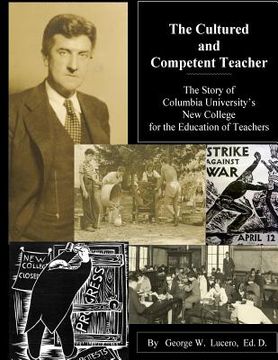The Cultured and Competent Teacher: The Story of Columbia University's New College for the Education of Teachers (in English)
Synopsis "The Cultured and Competent Teacher: The Story of Columbia University's New College for the Education of Teachers (in English)"
In 1932, an experimental undergraduate school for the purpose of teacher training was established at Teachers College (TC) during the Great Depression, a period of global, political and socio-economic turmoil. Planted amidst the conservative ivy of Columbia University, "the New College for the Education of Teachers" found itself rooted on the progressively left side of the greenhouse within an emerging social-reconstructivist tradition. Established under the leadership of Dr. Richard Thomas Alexander (1887-1971), New College, as it became known, was originally designed to operate as an undergraduate college level unit granting a Bachelor of Science and/or a Master's degree after a period of study from three to five years. It was to serve the dual purpose of preparing young people for teaching positions in elementary and secondary grades and of affording a demonstration college for graduate students in Teachers College. Students would ultimately become professors in colleges and universities with teacher training programs. What the institution evolved into was so much more. It took almost every accepted convention in higher education and rewrote it. This was a planned departure from traditional teacher-training institutions by placing special emphasis on child nature and development through experiences designed to give the student an insight into the problems of contemporary social life. Alexander developed a curriculum aimed to develop a critical consciousness in his students for intellectually-based social leadership and provide guidance in effectually meeting the universal Persistent Problems of Living, that is, the essential problems of living that students and in reality, all humans, would face in all stages of their development as individuals, as members of social groups, and as teachers of children and adults. The curriculum of Persistent Problems insists that you are always searching for solutions and thus constantly engaged in higher order thinking. Using innovative ideas such as extended foreign study, community-based active research, and authentic assessment, a portfolio-based undergraduate learning curriculum was developed which rejected traditional summative grades or the accumulation of credits as the basis of degree completion. This was truly a "learn by doing" experience. The nationally acclaimed New College would close within seven years under the pretext of financial hardship over the protestations of some of the country's leading academic, political, and social figures of the era. In reality, the school was closed because the students followed the ideals of the New College program which promoted participation in the creation of a "new social order" at the grassroots classroom level using the Concept of Community as a framework. Students were taught to solve the problems they encounter in society seeking solutions for the betterment of their students and community. Sometimes the solutions would put them at odds with powers that be, which preferred the status quo. This tiny experimental demonstration college and the significance of its philosophy, its students and faculty on the American educational landscape of the 1930's and beyond has been a long forgotten footnote in educational history. No complete chronological record of the school or its founder, Dr. Richard Thomas Alexander, exists today. It is hopeful that this book will fill that void in educational and curriculum history.

